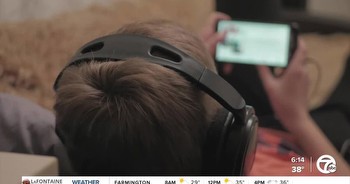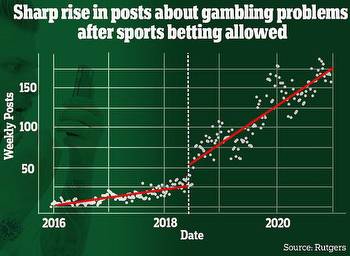Teens Are Developing ‘Severe Gambling Problems’ as Online Betting Surges

The growing acceptance of online gambling in the U.S. is permeating the nation’s universities, high schools, and even middle schools at a rate that is of growing concern to politicians, therapists, and local helpline workers, who are noticing more underage and youth gamblers coming forward with problems.
Since the Supreme Court ruled in favor of the sports betting industry in a landmark 2018 case that cleared the pathway for legalization around the country, online gambling fever has swept the nation. Celebrity endorsements have flooded the airwaves as sports betting has become legal in over 30 states, with more on the way. Some states, like Connecticut, Michigan, and New Jersey, have legalized online casino gambling as well.
Politicians and the industry have made attempts to expand legal online gambling responsibility. The age to legally bet on sports online is 21 in almost all states, and the legal gambling and sports betting industry has introduced a number of safeguards in an attempt to minimize online participation by underage Americans, according to Cait DeBaun, a representative for the American Gaming Association, a D.C.-based organization that lobbies on behalf of the industry.
Are you the parent or teacher of an underage gambler? Do you have information about the online gaming industry? We want tohear from you. From a non-work device, contact our reporter at maxwell.strachan@vice.com or via Signal at 310-614-3752 for extra security.
Those can include many of the same tools used by financial institutions online, including two-factor authentication, verification of a user’s location and Social Security number, and matching someone’s ID photo with a current photo of their face.
But there are growing signs that digitally native children are bypassing security measures with some frequency. In New Jersey, concerned parents have been calling the state’s gambling helpline with more frequency about their children. In Long Island, teens and people in their early- to mid-20s are now the “number one demographic” calling gambling helplines, said Pamela Brenner-Davis, who works at the Long Island Problem Gambling Resource Center.
“We have definitely seen a marked increase in the number of young people calling our helpline identifying a problem with gambling,” said Brenner-Davis, who said the increase began in January 2022, the month sports betting became legal in New York. Many of the calls are related to sports betting, she said.
This would represent something unusual, according to Jeffrey Derevensky, a psychology professor at McGill University who has studied youth gambling for decades. “Young people,” he said, “typically don’t call helplines.”
Gary Schneider, who has been in Gamblers Anonymous for over two decades, said more teenagers have started to join his meetings as well.
“In the last year, we are seeing more and more 16-year-olds, 17-year-olds, 18, 19, 22, 24 that are coming in with severe gambling problems,” said Schneider, who also sits on the board of the Stop Predatory Gambling Foundation.
Advocates of legal online gambling argue that regulated, legal online gambling is preferable to the alternative of illegal or offshore gambling, which offers less verification of (and deterrence to) young gamblers.
But the mainstreaming of legal sports betting and gambling has brought more people who had not been gambling into the fold. A September study out of Rutgers University on behalf of New Jersey’s Division of Gaming Enforcement found that only 40 percent of sports bettors in the state had been gambling before legalization in 2018, and almost half said they were betting more now.
The National Council on Problem Gambling has estimated that the national risk for gambling addiction increased by almost a third between 2018 and 2021, and that a significant percentage of the rise is attributable to men between the age of 18 and 24.
Online access has “exacerbated” gambling issues in New Jersey and elsewhere by making it “very easy to lose tens of thousands of dollars just by picking up your phone,” said Felicia Grondin, the executive director for the Council on Compulsive Gambling of New Jersey, which runs a state helpline.
Since 2018, when New Jersey legalized sports betting, call volume is up 225 percent on Grondin’s helpline. About 45 percent of calls are related to online gambling, and 35 percent of calls are from people under 25 or their parents and siblings. “We have parents calling our helpline expressing concern over their kids’ gambling,” said Grondin. One panicked parent recently called the helpline because their child had gotten access to their online gambling account and wagered a large amount.
Grondin said online accessibility was a “major contributing factor,” but so were online and television advertisements. A survey this year of 16-to-25-year-olds in New Jersey found that almost 70 percent saw at least four gambling ads on social media every week, and a national study commissioned by the NCAA and published in April found that ads for sports betting increased the likelihood that respondents would bet in the future, particularly Black respondents. “We're living in a very pro-gambling culture,” said Grondin. “It's much more socially acceptable to gamble now.”
Among the college-aged, sports betting and gambling has become largely normalized. The Rutgers study found that a third of those aged 18 to 24 were now gambling in some form online—four times as many as when the center last surveyed the state’s population in 2017—and 19 percent were at “high risk for problem gambling.” The NCAA study found more than a quarter of college-aged students had placed a sports bet using a mobile app or website.
For some, gambling issues can form well before they start college. Mike Sciandra, who works at Choices Treatment Center, an outpatient addiction treatment center in Nebraska that specializes in problem gambling, said he’s noticed more young children are coming for help than they were before.
“The big thing that we're noticing is that it is occurring younger and younger all the time,” said Sciandra.
The National Council on Problem Gambling has found that 60 to 80 percent of high schoolers have gambled in the past year, and 14 to 19 percent either fit the criteria of having a gambling problem or are showing “signs of losing control.” Overall, high schoolers exhibit double the rate of gambling issues as adults.
Saul Malek, a 25-year-old in Dallas, Texas, who speaks with high schoolers about his own past issues with gambling, has seen the issue firsthand. He said children have come up to him to talk about their own experiences staying up late to bet on soccer matches in order to cover past gambling losses.
The issues can extend down to even middle school. One 2021 study of New Jersey middle schoolers found that a significant number of them, and the vast majority of boys, are now participating in gambling and betting activities. The most popular ways are through purchasing loot boxes or skins in video games or betting on sports. The trend is notable, as past research has shown that children who bet by age 12—no matter how “harmless”—are four times more likely to develop a gambling problem down the line.
Sciandra and others told Motherboard that children have shown an ability to bypass safeguards and gain access to a family member’s account or plug in their parents’ email and credit card information without their knowing. Derevensky, the McGill professor, recently spoke to a young man who had stolen two of his mother’s credit cards and then racked up $10,000 in gambling debt on each before the mother found out.
But various experts also told Motherboard that parents and older family members often willingly hand over their login info to underage gamblers or serve as their de facto bookie. “We're finding that a pretty common thing,” said Sciandra. “It’s a bonding activity for a lot of families.”
For however many efforts the industry has made, “parents play an essential role in preventing underage gambling,” said DeBaun of the American Gaming Association. “Verified players, including parents or siblings, should never provide their credentials for children to gamble. It is not only against the law and operator terms of service but puts an adult product in the hands of a vulnerable population.”
“Instead, like any other adult product, families should have a healthy dialogue about the risk of gambling, the legal age, and how to engage responsibly,” DeBaun added.
In some countries abroad, the issue of online underage gambling has become a significant political issue. The president of the Australian Medical Association this fall described youth gambling as “a massive public health problem” in the country.
In the U.S., concern about youth gambling has been more measured, but some politicians are growing concerned. In Virginia last year, legislators unanimously passed a law that would require public schools to teach students about the potential dangers of gambling, like they do drugs and alcohol.
Sciandra, who works at the treatment center in Nebraska, said what makes the issue so difficult to tackle is that it is increasingly hard to see. Young people can slink into their phones and bet in silence with those around them none the wiser.
“A lot of our clients wouldn't be caught dead in a casino,” he said. “But they will be perfectly fine betting online on their phones at any time.”
































